Swan Song Star Naomie Harris On Reuniting With Mahershala Ali, Finding Strength In Vulnerability, And That Last Scene Of No Time To Die [Interview]
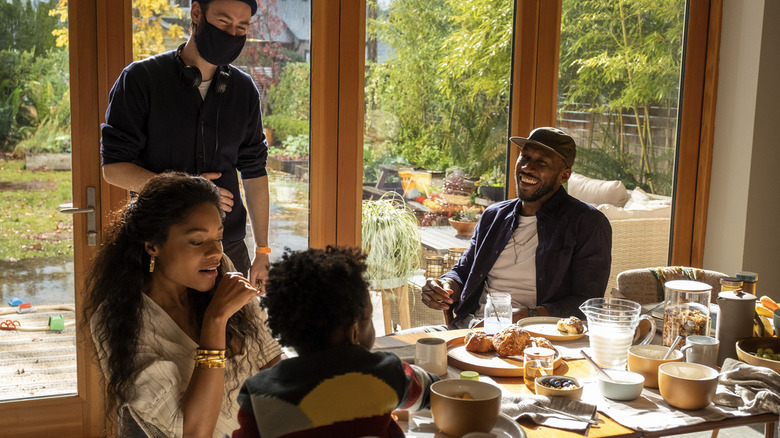
Naomie Harris and Mahershala Ali shared the screen together in Barry Jenkins' Oscar-winning drama "Moonlight," and now the two have reunited for "Swan Song," a sci-fi drama from writer/director Benjamin Cleary that hits AppleTV+ this week. Harris plays Poppy, a musician, teacher, wife, and mother who is unlike the characters the actress has become known for. This is the opposite end of the spectrum from her James Bond franchise character Eve Moneypenny, a role Harris reprised earlier this year in "No Time to Die." I had the chance to briefly ask her about that movie's, um, memorable final scene during a recent interview about "Swan Song."
Put this film on your radar, folks. As it stands right now, "Swan Song" is one of my favorite movies of 2021, a total surprise that came out of nowhere and quietly wrecked me as a viewer. Harris and Ali bring incredible pathos and gravitas to their roles, and the idea at the center of this story raises a thought-provoking question: If you were dying, would you give your memories to a perfect replica of yourself to secretly take your place so your family wouldn't have to suffer through the experience of losing you? I spoke with Harris about her initial reaction to the script, reuniting with Mahershala Ali, finding the vulnerability in her character, and yes, that last Bond scene.
No Reservations
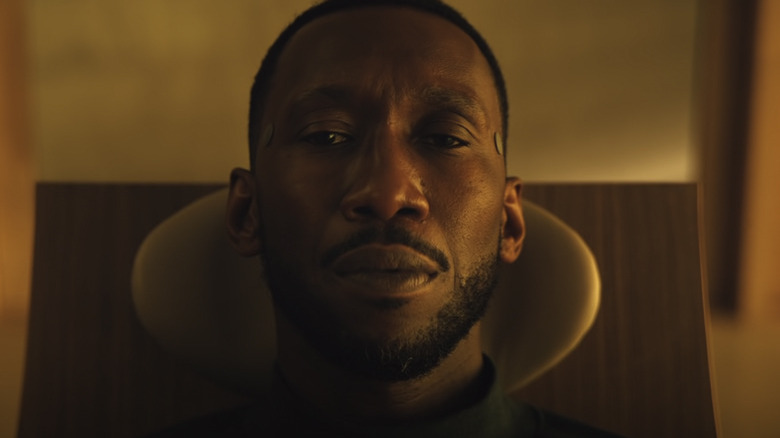
Do you remember your reaction when you read the script for the first time?
I do. I was in floods of tears and I thought, 'My gosh, if this is affecting me this much, making me think this deeply, then it's going to make a phenomenal movie.' Then I got on the phone with Ben and, I don't know if you've spoken to him yet, but oh my gosh -- he's just the most incredible human being. He's so sensitive and gentle and sweet. I just remember him saying, 'I want to create this magical environment on set where everybody's handpicked for how heart-centered they are.' And I just thought, 'Wow, I really want to work with this guy.'
So you didn't have any reservations at all about him being a first time feature filmmaker?
No, not at all. I saw his short film and it was just absolutely incredible. So I knew that he'd make a great director. And also, I think the most important thing for any director is actually to have sensitivity, and Ben is one of the most sensitive people that I have actually met and worked with. I knew that he would make a great director. Also, Mahershala trusted him to do this project, so I thought Mahershala definitely knows what he's doing.
Making The Character Her Own
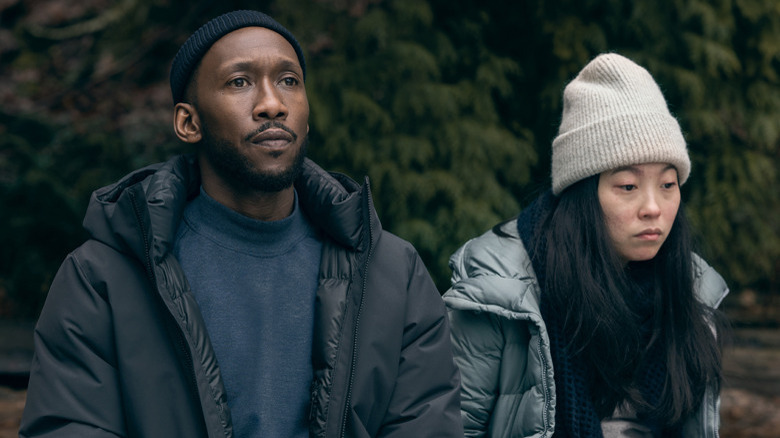
Speaking of Mahershala, you and he are both so excellent in this, and I'm guessing you guys were fairly comfortable with each other, having worked together before. But I'm wondering if there were any specific scenes or moments on "Swan Song" where you felt like that prior working relationship that you two had was particularly beneficial for you while making this movie.
So we didn't actually really have much of a previous working relationship, because on "Moonlight" we only worked together for a day. We really didn't know going into it how we both worked, but it was really wonderful to discover that actually we work in a very similar way. We both don't particularly like rehearsal. We both like to do our own research separately, and then come together and just basically do it in the moment, on film, and discover each other and discover truth, and discover where we're coming from in the moment. So it was perfect, it really was. But we didn't know that going into it.
Was there a time in the production where you really settled in and felt comfortable enough with the Poppy character to the point that you started offering little tweaks and suggestions about her behavior or what she might do in a given scene?
Absolutely. One of the most important things, I think, with acting is ownership. I think that's one of the things I learned very early on in my career. When somebody gives you a role, they give it to you. Actually it was Winnie Mandela who taught me this as well. Because when I played her, I remember being really concerned about how to play her. And she said to me, 'You have been given this role because they think you're right for it. So you do it as you see fit. Don't ask me, don't ask anybody, it's your interpretation.'
I think that's incredibly important for actors that you take full ownership and do what you want with the role. The writer has created the part up to a certain level, and then you take it the next level by adding all these kind of subtleties that they couldn't foresee. So definitely, I brought life to Poppy in the way that I thought was right. And also, there was a lot of improvisation in the script as well. So there's a lot of room to add dialogue that I felt Poppy would use.
Impacts Of Covid
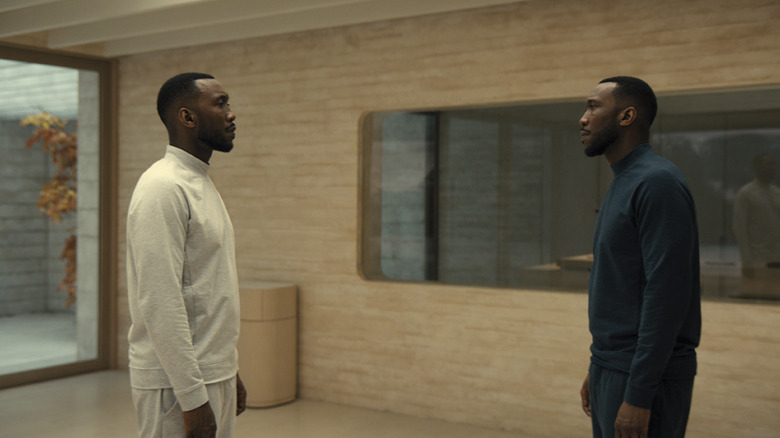
I was going to ask you about improv, because the movie just feels so natural and sort of free-flowing. What was the filming experience like for you? Was it you guys sort of finding a lot of it on the day? Your initial reaction to the script leads me to believe that most of the bones of the thing were there, but what was the filming experience like for you?
So the script was completely written with all the dialogues that we have, all those scenes and those were all -- I haven't seen the movie yet, but I imagine those all still in the final edit. But in addition to that, then we do improv scenes as well. Some directors have really done amazing movies where it's all based on improv, but generally I think it works when you really have the structure of the script. The script is your real Bible, and that really has to guide and lead you, and you have to lean on that.
Was it a quick shoot for you? Do you remember how many days you shot?
I believe it was three months, I want to say. And it was in Vancouver. It was a very unusual time obviously because it was during Covid. So we were encouraged not to go to restaurants, not to go out, not to hang out with many people. And if you were hanging out with anybody, then to do it outside. It was kind of like you were making this movie that's all about deep connections in a time where you're not really allowed to have connections with people. So it was really interesting.
Poppy's Vulnerability
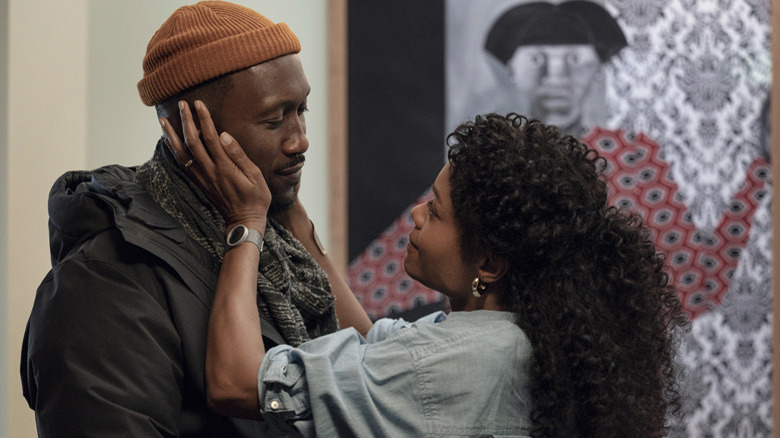
This is just such a profoundly human story, and your character in particular deals with some really heavy emotions as she grapples with this death that's happened in her family. From an outsider's perspective, it seems like those vulnerable scenes may have been the toughest for you to pull off. But I'm curious if that was actually the case or if another scene maybe proved to be more difficult to get right.
I think that I did struggle, if I'm honest, with the vulnerability of Poppy. In terms of my body of work, it's really ... I generally gravitate towards playing strong characters, strident characters. So having to inhabit a character that is so open, that is so vulnerable, that's so centered in her heart, I really did struggle with that. But actually, the main lesson that Poppy taught me was actually there's such strength in that vulnerability. She really took me on a journey, this character, to learn that. And she taught me about being a better human being by being more vulnerable in my everyday life. That's one of the wonderful things about this profession: Every character you play teaches you something about yourself, and takes you on an amazing journey.
I found the experience of watching this movie to be so refreshing because in today's bombastic movie-going landscape, there's a lot of noise out there. This movie is so small scale but in the best possible way, where it just feels like it's dealing with genuine human interactions and human emotions and connection. Was that an element of this script that drew you to this part as well?
Definitely. Also because I just think so many of the movies that we have that are about love, are about the initial stages of love. So you don't really see movies that are about this kind of depth of connection, where a couple have been together for decades and know each other inside and out, and are willing to really sacrifice their own happiness for the happiness of their partner. I think it's a reminder about what true love really is about.
Saying Farewell To An Old Friend
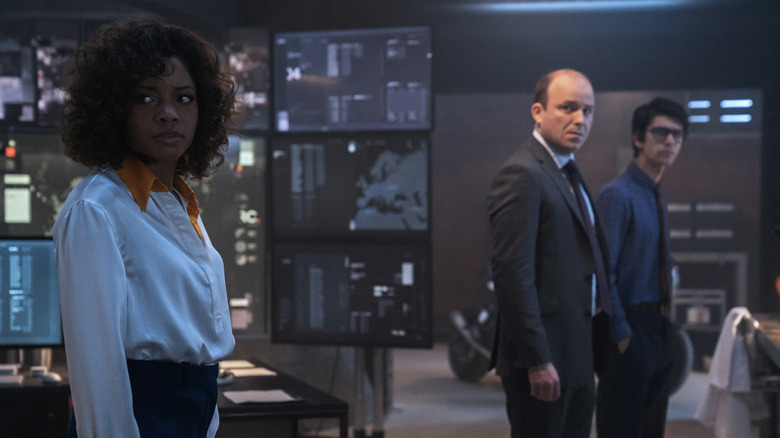
That's great. I finally caught up with "No Time to Die" recently, and it easily vaulted into my favorite Bond films ever. I'm going to put a spoiler warning in front of this. [Editor's note: Spoilers for "No Time to Die" ahead.] But now that the film has been out for a while and people can see it at home, I wanted to ask you about that final scene in that movie where you all gather around and toast Bond's memory. That's a unique scene that will probably never be replicated in another Bond movie. So I'm just wondering, from your perspective, what was the mood like on the set and what was it like filming that cinematic sendoff?
It was actually really somber. I think when you're watching it, it feels incredibly somber, and a really special moment, like you say. And I think we really felt that as well. And we all felt kind of at a loss as well, because we've lost 007. And we have no idea who's going to be the next 007, or which direction the movies are going to go in. Whether we're going to be in them or not, we don't know. It was very somber for us.
"Swan Song" will be available to stream on AppleTV+ starting December 17, 2021.
Read this next: The 14 Greatest Science Fiction Movies Of The 21st Century
The post Swan Song Star Naomie Harris on Reuniting with Mahershala Ali, Finding Strength in Vulnerability, and That Last Scene of No Time to Die [Interview] appeared first on /Film.
from /Film https://ift.tt/3F5D9eG
via IFTTT
Comments
Post a Comment